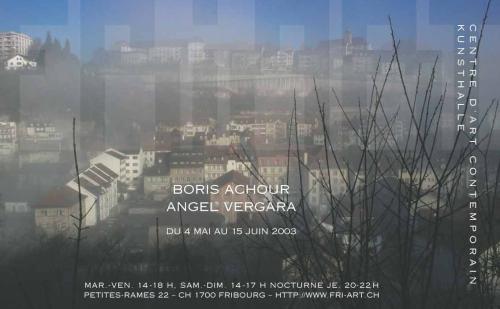Boris Achour, Angel Vergara
dal 2/5/2003 al 15/6/2003
Segnalato da
2/5/2003
Boris Achour, Angel Vergara
Fri Art - Kunsthalle Fribourg, Fribourg
Initially questioning the codes and social conventions born of a popular or mythical culture, Boris Achour and Angel Vergara both construct their work around mechanisms linked either to mass or autocratic production. In the Fri-Art exhibition, the works of Boris Achour and Angel Vergara complement each other, introducing visitors to "off-limits" areas, and enabling them to revise their own critical tools with respect, wit and humor.

Initially questioning the codes and social conventions born of a popular or
mythical culture, Boris Achour and Angel Vergara both construct their work
around mechanisms linked either to mass or autocratic production. They use
imaginary accounts to recreate fiction, building a universe which mixes
interpretative modes based on reality or tradition, causing the viewer to doubt
his common sense, to play with reality and shift the primary function of an
object or means of action.
With his illuminated sign "Je ne veux tout" (2000), Boris Achour examines our
identity in a society that suffers from consumerism and its habits. The "Sommes"
(1999), an ambiguous title for a photograph of a subject sleeping in a vertical
position, head resting on the neatly trimmed hedges around an affluent property
in Los Angeles. This universe seems perfectly absurd because it features a
person or figure akin to fictional anti-heroes. The same can be said of Achour's
automatic glass swing door, the mechanism of which does not react to the
visitors' movements, but to random computer-generated impulses. Based on
anomalies or exceptions, this work is part of a unilateral system of exchange
which submits the viewer to an external logic. Reestablishing the work's
internal dialectic, the artist successfully orchestrates new webs of unheard of
meanings. Created for Fri-Art, "non-stop paysage" (2003) is a world in itself, a
playful landscape in which viewers find themselves and move away from scenarios
that hold them prisoner. It is noteworthy that this work asks questions to which
there is no answer, poses insoluble mysteries, and brings about casual
encounters that remind us that nothing is due to accident.
Day-to-day life inspires Angel Vergara. Reality becomes the place where
everything is possible, an area for exchange, transformation and circulation. In
his performances, Vergara becomes Straatman, "the man in the street", who
abandons his brushes and becomes a mobile work (of art). At other times he hides
behind a black rubber mask with African features to denounce racial inequality.
He also likes to stage unpredictable meetings that upset and disturb our daily
routine.
Vergara launched the "Nanards", a currency that has been accepted by shopkeepers
in the French town of Revin. This led to a downright "nanarchy" in the public
space, and revolutionized the established order. In his "Gelateria del Año", the
artist rolled through Aachen on a tricycle during one summer season, pulling an
ice-box and selling ices named Kiss, Perfume or Conversation. Angel Vergara
likes to parody consumer products and certain myths, and uses fancy dress to
denounce the rigidity and coldness of certain systems with greater eloquence.
With the situation in Irak the most burning current public concern, Vergara is
working on a project for Fri-Art together with the swiss army, intended to shed
light on military culture. Over centuries, its great epic works, based on the
praise of heroic acts - which were not necessarily purely warlike - controlled
the world. "All the pure and noble arts in peacetime are based on war; all great
art has been produced by warlike peoples", wrote John Ruskin, a major 19th
century art critic around whom Vergara structures his investigations. To bridge
the gap between these two cultures - war and peace - which now appear to be so
far apart, it might be useful to find a common approach to their history,
sounding out the relationship between artists, writers and military campaigns.
In the Fri-Art exhibition, the works of Boris Achour and Angel Vergara
complement each other, introducing visitors to "off-limits" areas, and enabling
them to revise their own critical tools with respect, wit and humor.
Opening Saturday May 3 at 5 p.m.
Opening hours : Tues.-Fri. 2-6 p.m., Sat.-Sun. 2-5 p.m., Thursday evenings 8-10
p.m.
Guided visits at 8 p.m. on Thursdays, May 8 and 22, 2003
Next exhibition : Goddy Leye, Omer Fast, Senam Okudzeto, 05.07-16.09. Opening
Friday, July 4 at 6 p.m.
Fri-Art
Petites-Rames 22 Case postale 354 CH 1701
Fribourg



